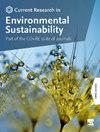Adapting to climate change under threats of violence: A comparative institutional analysis of incentives for conflict and collaboration
IF 3.8
Q2 ENVIRONMENTAL SCIENCES
Current Research in Environmental Sustainability
Pub Date : 2025-01-01
DOI:10.1016/j.crsust.2024.100276
引用次数: 0
Abstract
Research on climate and conflict often emphasizes violence and its drivers, overlooking the prevalence of collaboration in shaping social relations. Addressing this gap, this study undertakes a comparative institutional analysis of community-level responses to climate threats in violence-prone settings. The research explores conditions that incentivize either cooperation or conflict, refraining from presuming one outcome as dominant. Using a structured analytical framework applied through a thematic analysis, it systematically examines environmental, relational, institutional, and systemic patterns across three case studies of localized collective adaptation to climate change under varying forms of violence. These case studies are located in Guatemala, Philippines and Kenya. The study identifies 18 factors that drive conflict or foster collaboration, revealing that while these factors are broadly consistent across contexts, their effects are highly context-dependent. In some cases, the same factor contributes to both conflict and collaboration within shared adaptation arenas, underscoring the complex interplay of drivers. These findings highlight the importance of analysing interactions among drivers when designing collective climate adaptation efforts, emphasizing opportunities to mitigate violence and foster collaboration. The study concludes that enhancing adaptive capacities and climate-resilient peace requires expanding adaptation strategies to address often-overlooked dynamics. These include the historical processes underpinning institutional multiplicity, the legitimacy of local security forces, and the cohesion among neighbouring communities. By realigning incentives toward collaboration, such interventions can simultaneously build resilience and advance peaceful relations, providing actionable insights for policymakers and practitioners working in violence-prone regions.
在暴力威胁下适应气候变化:冲突与合作动机的比较制度分析
关于气候和冲突的研究往往强调暴力及其驱动因素,而忽视了在塑造社会关系方面普遍存在的合作。为了弥补这一差距,本研究对易发生暴力的环境中社区层面应对气候威胁的措施进行了比较制度分析。该研究探讨了激励合作或冲突的条件,避免假设一种结果占主导地位。通过专题分析,采用结构化的分析框架,系统地考察了在不同形式的暴力下局部集体适应气候变化的三个案例研究中的环境、关系、制度和系统模式。这些案例研究位于危地马拉、菲律宾和肯尼亚。该研究确定了导致冲突或促进合作的18个因素,揭示了尽管这些因素在不同的环境中大致一致,但它们的影响高度依赖于环境。在某些情况下,同一因素在共同适应领域内既会导致冲突,也会导致合作,这凸显了驱动因素之间复杂的相互作用。这些发现强调了在设计集体气候适应工作时分析驱动因素之间相互作用的重要性,强调了减少暴力和促进合作的机会。该研究的结论是,增强适应能力和气候适应型和平需要扩大适应战略,以解决经常被忽视的动态问题。这些因素包括支撑体制多样性的历史进程、地方安全部队的合法性以及邻近社区之间的凝聚力。通过重新调整促进合作的激励措施,此类干预措施可以同时建立复原力和推进和平关系,为在暴力易发地区工作的政策制定者和从业者提供可行的见解。
本文章由计算机程序翻译,如有差异,请以英文原文为准。
求助全文
约1分钟内获得全文
求助全文
来源期刊

Current Research in Environmental Sustainability
Environmental Science-General Environmental Science
CiteScore
7.50
自引率
9.10%
发文量
76
审稿时长
95 days
 求助内容:
求助内容: 应助结果提醒方式:
应助结果提醒方式:


